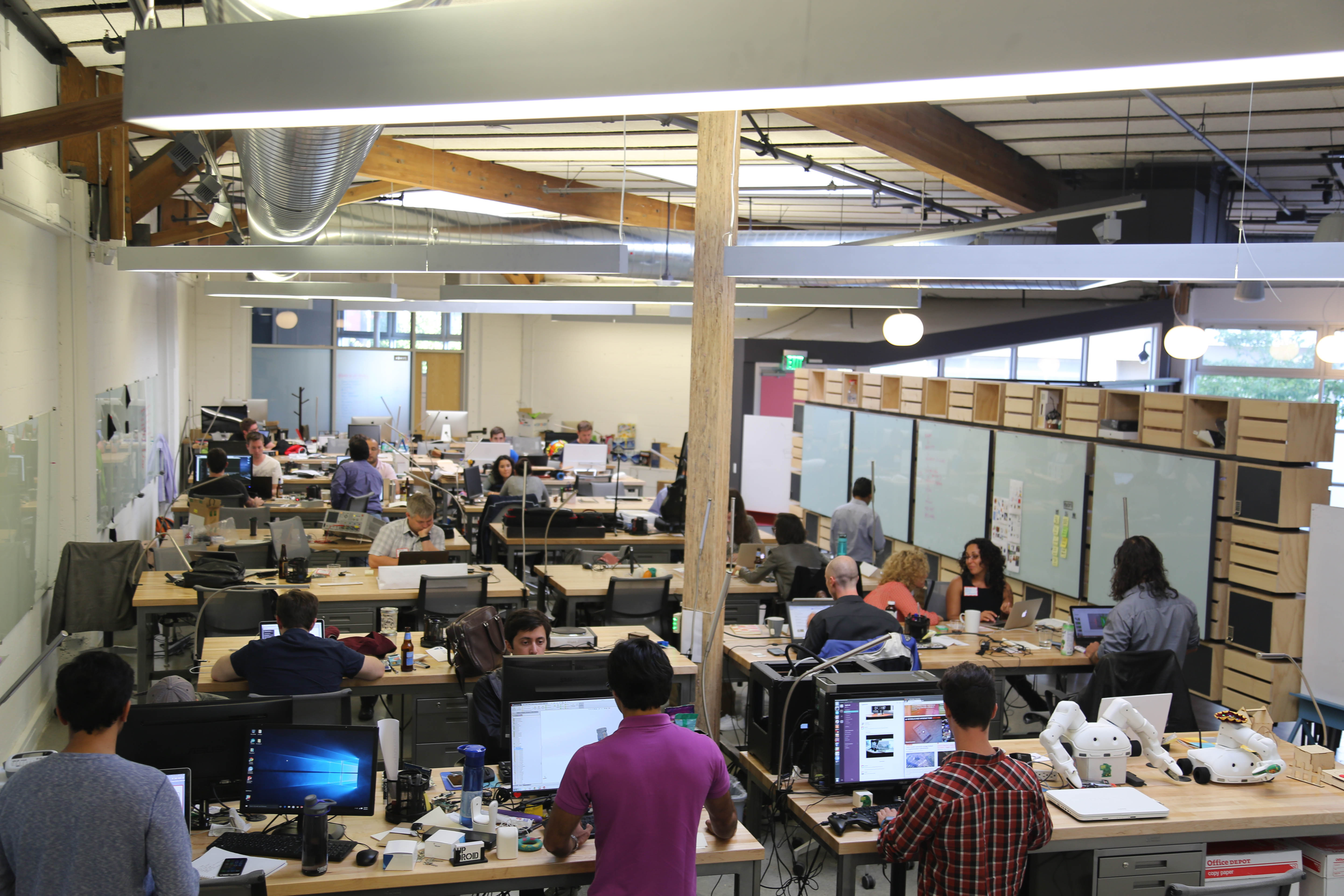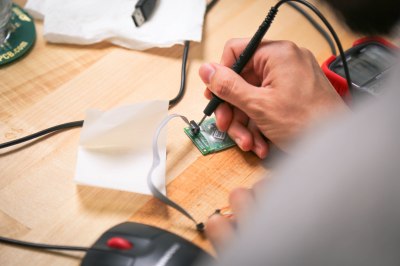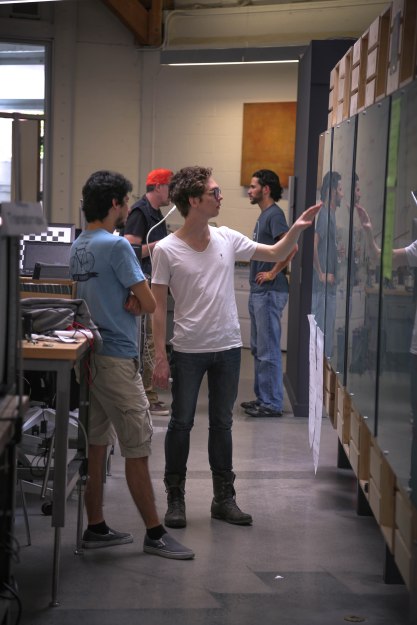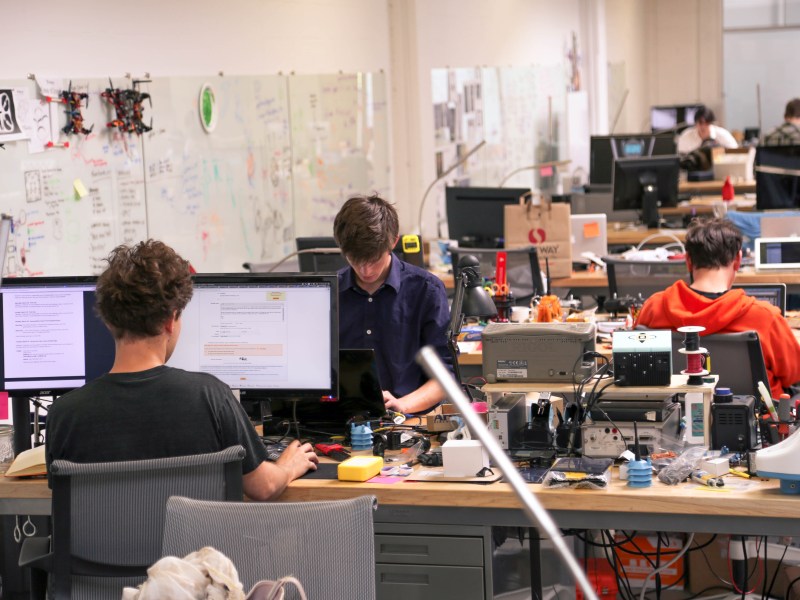I was visiting San Francisco, scratching my head for something cool to cover for Hackaday. When it hit me: this is one of the leading cities in the world for starting new companies. It’s known for its software, but with Tesla, Type A Machines, Intel, Apple, and more within an hour’s drive of the city, there’s got to be a hardware scene as well. Silicon isn’t a software product after-all. But where do you find it, and how do you get a hardware start-up going in one of the most expensive cities in the world?
That’s where hardware accelerators or incubators, whichever name they prefer, come in. One-third hackerspace, two-thirds business crash course, they help you skip a lot of the growing pains associated with starting a capital intensive thing like a hardware business. I dropped in, and they kindly gave me a few minutes of their time. I wanted to find out what a hacker could do if they felt it was time to turn those skulls into dollars. What are the requirements. What is the cost? What help does the incubator offer to the burgeoning capitalist in a hacker?
I’ve worked for companies that I would describe as ten year start-ups. They started on their own, they found a good market, but without assistance they managed to flounder their lead and grow stale. There’s just so much to a hardware start-up. There are so many easily de-prioritized little things that seem obvious or easy, but ignoring them may bite later. How do you manage your drawings? Your suppliers? How do you build an efficient assembly process? How do you manage inventory? What the heck is lean? If you buy a machine, will the return on the investment be more than the declining value of the capital put into it? How do you maintain a competitive edge when the cost to pivot is high? Let’s not even get started on lawyers.

On this trip to San Francisco I stopped by Highway1.io, an accelerator run by PCH. We’ll cover others in the future to see what they’re like. The first thing that struck me as I walked in is the atmosphere. Every table in the place was covered in parts, computers, and projects in various states. It felt like the last hour of a hackathon, but the impression I got is that of an everyday event. It must be incredibly fun to be surrounded by people working their absolute hardest to complete a goal, and see where they can take it.
The first floor of the space contained a reception area, kitchen, a conference and presentation zone, and work tables. Most of the work tables were taken up by the companies, but at one end of the room sat a group of full time engineers specifically hired by Highway1 to help the start-ups. Have a question about injection molding? Having a hard time finding the right chip? Just ask the staff engineers.

Aside from tables and engineers, Highway1 also boasted a fairly comprehensive shop. The electronics section was outfitted with high-end soldering stations, measurement equipment, and the regular stuff you’d expect. They also had a few extras, like a manual pick and place, PCB prototyping equipment, expensive 3D printers, and other more specialist equipment. In the mechanical section there were all the usual shop tools, drill press, band saw, etc. There was also a three-axis CNC and a technician to go with it. Most prototyping needs could be met on site.
The program’s philosophy stems from the concept that there’s no way to get a product to a level of mass manufacturing in a four-month timeframe. The goal is demo day. If you can get investors on board, full production is no longer out of reach. To get there you’ll need an advanced prototype and a rock solid business plan.
To that end, you’ll naturally spend a significant amount of time hacking. If you’ve never used them before, it’s time to add new tools to your box such as user testing and validation. You’ll also get to work with world class industrial design firms to make your product shiny and chrome. Highway1 start-ups have worked with big names like IDEO, Ammunition, and Whipsaw to get products that sell by more than their inherent utility. No matter what you start with, by the end, you’ll have something that’s a far cry from a 3D-printed project box with debug cables snaking out of the cracks.

Aside from tweaking your product with design for manufacture and price in mind (to prove you can build the dang thing) you’ll be working heavily on your business plan. The hacker world is full of examples of home hardware start-ups that went bust because they built beautiful hardware and fed it into terrible business machines. Don’t go LumenLabs.
So, what about the money? Well, Highway1 offers $100,000 US Dollars of investment capital at 8% or $50,000 at 5% depending on the project. That number is certainly nowhere near enough to start a hardware business, but I think there are a number of reasons, based on my own experience, why giving away this amount of equity is worth it.
The cynic can argue correctly that from a purely financial point of view they have a relatively small amount of capital to lose with each start-up. However, their game is the same as yours, they hope to take a risk and make a large return. In some regards they are risking more than just a small amount of capital. They have a network of investors who will be showing up to see a presentation, if there’s nothing the investors like, they may not show up again. There’s time cost, management cost, and more.
Also, when it comes to a business, there’s just so much you can’t google and that you shouldn’t have to. They will help you make sure that you hire the right people, that you have the right supply chain and business model from the start. How do you manage drawings? What do you do with estranged capital when you make a change to your hardware? Taxes? How do you estimate your burn? How do you vet an investor? There are things that extend far past engineering and there’s nothing better for increasing chances of success, than being surrounded by people who have done it before. I can personally vouch for the utility of an accelerator; they are intensely rewarding experiences.
Another advantage, though particular to this accelerator over other’s is PCH’s specialty in supply chain and manufacturing. A large bundle of PCH’s primary business is hooking up manufacturers with overseas suppliers. So if you’re making your first electronic widget, PCH has specialists who can find you a trusted supplier in Shenzhen and help you negotiate all the troublesome complexities that baffle most first timers to overseas manufacturing. In fact, part of the program is a 10-day trip to Shenzhen to meet with potential suppliers and see how manufacturing is done in the area.
Lastly, never underestimate the power of a network. Four months in San Francisco sitting on a park bench may net you more industry contacts than a year in rural Indiana. All the start-ups that come out of an accelerator traditionally have the contact information for the others. Having trouble finding a supplier or market? Call up another start-up and ask them how they did it. Start-ups also have full contact with the accelerator, and usually a member from that incubator on their administrative board. Especially with a company like PCH this would be a big tap on experience that a burgeoning hardware company would normally not have access to.

So what do you need to apply? Well, a company, or at least a very promising larval state of one. Highway1 does not accept solo entrepreneurs. So if you’ve got the next big thing go find a partner. Find some people who complement your weaknesses. If you’re a Woz, find a Jobs. If you’re a Jobs, well, be nice to Woz this time around, okay?
Aside from that, Highway1 recommends having a mostly developed product or idea. It’s not a place to have someone hold your hand through the basic development process. They want to get you to that final stage, so the work will be high level. Spend some time on industrial design and branding. If you can only do ‘engineer’ or ‘programmer’ art, find a person. A rat’s nest on a protoboard does not a product make. They want to see that you can do it yourself; the hope, after all, is that you can go off to grow a company, and make money for everyone involved. They also need to see a market for the product, if it’s not intrinsically obvious, it would help if you’ve funded a Kickstarter (On a separate project preferrably, to show you’ve found a niche before.) or have a big packet of market research pointing to untapped millions. Something to show. The applications are open worldwide.
An accelerator is not just a good way to get a competitive edge right off the starting line, it’s also a way to test the idea in the first place. If you have an idea that you’d like to see take-off I recommend going through the application process of any accelerator. You don’t have to accept, but you’ll be surprised how much you learn in the doing. This is not the only path to success, but it is a good one to consider.
Author’s Note: To write this article, I literally googled for Hardware Incubator and then dropped in on the first one that would have a conversation with me. It is not an advertisement, I’m genuinely excited for the opportunity this might present for the enterprising hacker.
In one of my many attempts to start a company, I decided to go the accelerator route despite my natural skepticism about the concept. In the three weeks spent applying for the accelerator, the feedback received from the program dramatically refined our approach and business plan for the product. In the end the incubator helped us discover a competitor with a significant edge who had moved into the area under the radar. While disappointing, it certainly saved us from a difficult future, and equipped us to try again more successfully with a new idea.
If you can find one with a good reputation I would highly recommend having a conversation with them and the teams involved. While at the LVL1 hackerspace in Louisville, I saw lots of companies get real traction with even the small ones available in that area.















Thanks, right up my alley this morning.
I want to go there, badly.
“Anything worth doing, is worth doing badly” G. K. Chesterton
I have wondered how to get my projects out there, and I am really having great luck with my current Kickstarter. I am shocked at the audience it commands.
Just to complete the thought here, I have really high hopes for Tindie, especially now that it has merged with Hackaday. However, I sold more product on Kickstarter in one hour than I have on Tindie in two weeks. It’s just a huge audience, and they seem to respond well to having a real product that doesn’t promise too much.
“and they seem to respond well to having a real product that doesn’t promise too much.”
Your product?
B^)
I thought it was going to say
When You Get Serious About Selling A Project, Forgo Open Source.
CaptMcAllister: I’m shocked that you didn’t put a link to your Kickstarter. :)
Well that would just be crass :)
If you’re dying to know, it’s linked from one of my project pages.
I like the way you roll.
Thanks Mike. I’m a fan of your work as well!
It’s good enough that it deserves promotion – hope you don’t mind me sharing? :D
https://www.kickstarter.com/projects/1710326172/boostick-small-aa-voltage-booster
Been needing something like this often, and even looked into doing it myself. Well done!
By all means, share it if you like it. I didn’t actually come in here to promote it, just to express my absolute shock that Kickstarter really is as big as they claim. Glad people like the idea, simple as it is :)
Cool idea. I was going to build something like that for my own purposes but ended up just using an unregulated LiFePO4 cell instead.
Good luck with your kickstarter; crossing your target in a week is great!
When You Get Serious About Selling A Project, Forgo Open Source. Reference the LumenLabs article link above.
Not quite. The lesson here is to forgo open source until you’ve reached good economies of scale. Then you can open-source your design, and incorporate any improvements made to it by others, while still being able to beat Joe Shmoe and his garage CNC in both price and quality.
Quite not.
As scale increases, open source becomes an even more horrible business decision. Contrary what some think, a lack of open source is not a greed move and it’s not new. Just what’s required to stay in business. You can rest assured that if a company is releasing documentation, they are not competing on any design innovation level.
OSHW companies maintain their position with branding, logistics, supply chain, advertising, etc., NOT through innovation. Look at any successful OSHW comany. 99% of the time they’re just an online distributor selling Atmel development platforms blinking LEDs with educational information.
Please argue why Apple, the largest in terms of economies of scale, should release all their documentation.
In regard to these accelerators, no. Dumb idea. They were started by investors wanting to get-in earlier and for the least amount than anyone else. Keep that in mind.
Yep, looked, and backed. :)
Incubators are a horrible choice in most cases. They take far too large a stake for what they offer, they have poor market understanding outside of a narrow scope, and they are the ultimate expression of a harmful parasitic relationship at a time when new businesses need a clear vision. The level of business intelligence, and sometimes technical intelligence, is very poor at the dozen or so incubator events I have attended.
A project should always be marketed for sale as part of an existing company. The corporate world has few policies and mechanisms to work with individuals when acquiring assets. I wish Hackaday would have enough editorial sense to keep a piece like this off its pages. I don’t come here to read another regurgitated rehashing of an ignorant viewpoint held by those who don’t want to take the trouble to understand business norms and think that entrepreneurship is coming up with a neat idea.
Also, fuck open source until your hardware is mature, then give the design away if you are generous. Too many people make up their own open source rules or are just outright liars and thieves; open is not an obligation.
Agreed. Most people visiting the event will be ill served by them. Business is business and hacking is hacking. Having a nice product is the least that’s necessary for a successful company. I know lot’s of companies selling crap and being successful and lot’s of inventors who crashed and burned badly with their quality invention. Don’t get fooled by the get-rich-quick and Silicon valley mania mixture sold there!
“and they are the ultimate expression of a harmful parasitic relationship at a time when new businesses need a clear vision.”
Kind of like Arab banking…
(no smiley intended)
We need more details about the guy with the white t-shirt and the plug coming out of his head. Are they building the matrix ;p
+1
Thanks for the article. It would be nice to hear more from people that have successfully navigated the perils of getting a product to market. Back with the Pi first came out there were brief discussions about supply chain issues etc. What would have been great for example would have been an in depth discussion on how they went from concept through production. How did they determine which contract manufacturer to use? What supply chain issues did they face? What was it like negotiating with distributors to sell their product?
“However, their game is the same as yours, they hope to take a risk and make a large return”
No it isn’t. You’re all-in on one single long shot bet, where as they do dozens of bets risking only chump change on each individually.
“In some regards they are risking more than just a small amount of capital. They have a network of investors who will be showing up to see a presentation, if there’s nothing the investors like, they may not show up again. There’s time cost, management cost, and more.”
This makes it sound like they are risking more than you, which is definitely not the case. What’s your cost if things go sour, as they will at least 90% of the time?
Nothing against incubators in principle, but this article just repeats the platitudes found on their websites without a realistic assessment of risk vs. reward from a hacker’s perspective.
Agreed. You nailed it with: “You’re all-in on one single long shot bet, where as they do dozens of bets risking only chump change on each individually.”